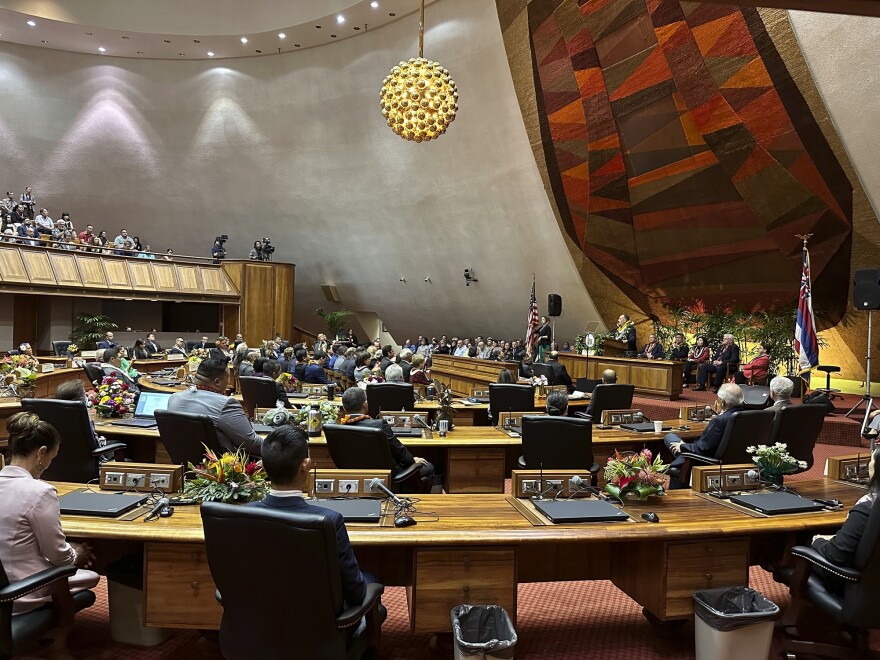The 2024 general election was seen as a big win for Republicans, not just nationally, but locally as well — particularly in West Oʻahu.
North Shore state Sen. Brenton Awa pointed to the election as a historic one for Republicans in Hawaiʻi.
“If we're talking 30 years from now, we're looking back at 2024, what difference did it make? I believe, and so do Diamond, Sam, people in our party, that the opportunity that people just gave us is once in a lifetime,” he said.
Awa and fellow Republicans Rep. Diamond Garcia and incoming Sen. Samantha DeCorte won their Oʻahu districts in the general election. Each of them successfully flipped a blue seat to red when they were first elected.
Republicans picked up three seats in the state House and one in the Senate. All the Republican incumbents, including Awa and Garcia, retained their positions.
Those gains came from leeward Oʻahu.
Sharon Quinsaat, a sociology professor at Grinnell College in Iowa, has been working on a study about Filipino conservatives. She spent time in Hawaiʻi interviewing people and observing Garcia’s campaign in District 42 against Democrat Anthony Makana Paris.
People were most concerned about issues like the high cost of living and housing.
“They've been saying that has been the issues that the Democrats haven't addressed really,” she said. “Because the Democrats are the majority in Hawaiʻi, they feel that they have been complacent because there's no challenge. So some of them say, maybe if we have at least some Republicans there, they could have that challenge.”

Garcia’s campaign was centered on eliminating income and significant portions of general excise taxes. The details on how to replace that revenue were sparse — and will be something the Legislature will need to address after passing historic income tax cuts that have concerned some stakeholders as the state faces steep expenses in the coming years.
However, during a Honolulu Civil Beat town hall, Garcia’s responses to questions were met with loud applause. In comparison, Paris received little to no reaction.
Garcia puts the blame of high taxes and cost of living on Democrats, who have held a supermajority in the state for years. In the upcoming legislative session, Republicans will hold three seats in the 25-district Senate and nine seats in the 51-district House.
Ryan Mandado, a school leader at DreamHouse ʻEwa Beach Public Charter School, said it’s the same sentiment he hears from parents and community members.
“It's really the sentiment of, no one in government is helping Indigenous people, or no one in government is helping Native Hawaiian communities,” he said. “But the person that I know and trust is voting for blank because they think they're going to give money to Hawaiians, or they're going to give us more opportunities to buy a house, or there will be overall more money in my pocket so I can buy food for my family.”
The concept of putting trust in your community is another way that Republicans have been able to make gains in these areas.
Quinsaat pointed to the power of churches that are in favor of more conservative policies, but are often the entities in the area providing services like daycare and English language assistance for Filipino immigrants that come to Hawaiʻi.
“Your social network is the church, and you really put your trust in that church,” she said HPR. “So come election time, whatever it is that their pastor or everyone else talks about in the church, of course, you already believe because that is already your community since you arrived here as an immigrant.”
Quinsaat explained that while the churches arenʻt necessarily talking about who to vote for, they are often talking about issues that can be political.
“When we talk about politics, we often think about the big politics with a capital P, like voting or something, but they do talk about politics in an everyday sense, for example, protecting the family,” she said.
Mandado, a Democrat, added that he cannot point to spaces in West Oʻahu where progressives can talk about their ideas or gather in the same way. However, the school leader noticed that it's also important to meet people where they're at with the type of language used to talk about Democratic core issues in Hawaiʻi.
“This happened two years ago, our students won a grant to talk about LGBTQ issues and support families in them,” he said.
“When we labeled it as LGBTQ awareness training, major pushback. When we switched it to māhū education, large crowd, large understanding. We were talking about the same thing, but māhū education was cultural-based. It was something that they understood... I think there is a disconnect in the messaging of what is authentically Hawaiian and how I feel invited into those conversations.”







